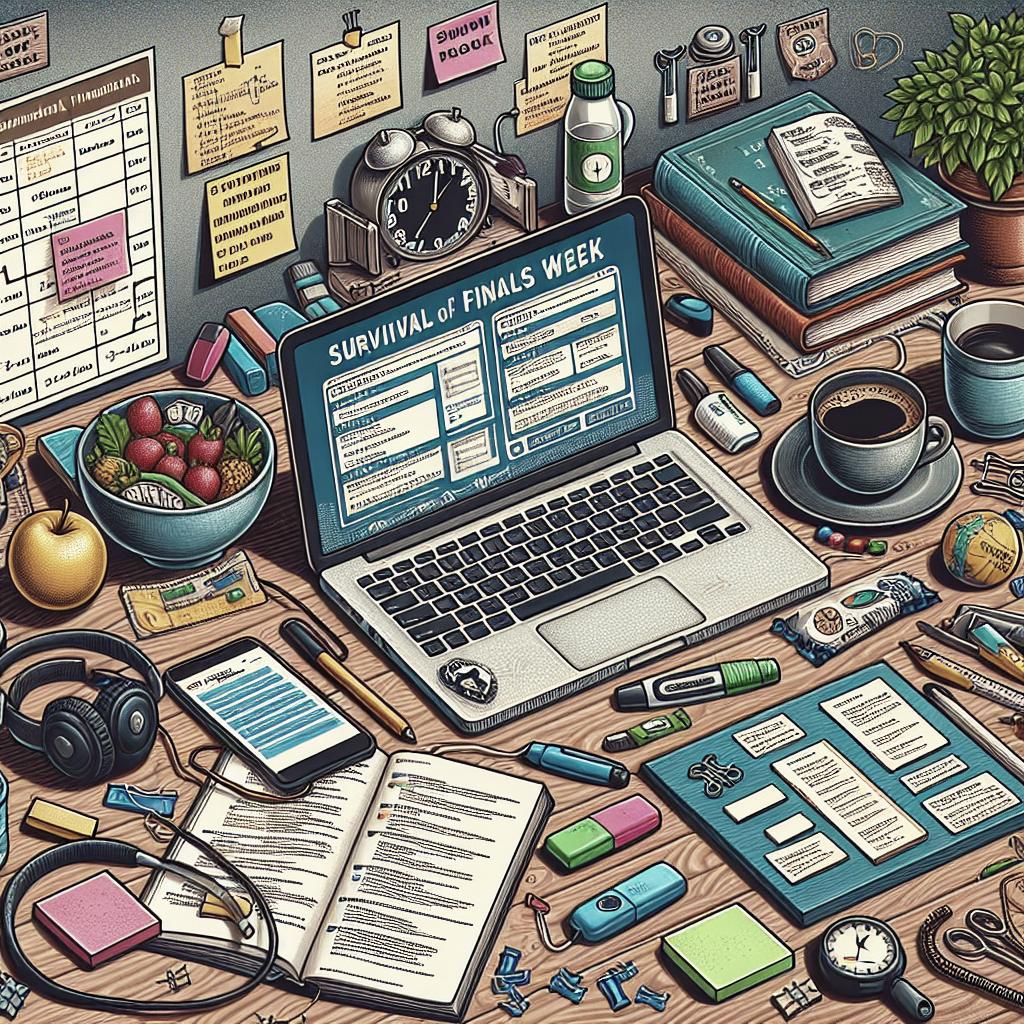“`html
Finals week is one of the most stressful times of the academic calendar, but with the right strategies, you can power through it successfully. This guide will help you with practical tips to stay focused, healthy, and efficient during this critical period. From avoiding procrastination and getting adequate sleep to finding the perfect study spot and curating a concentration-boosting playlist, each tip is designed to help you succeed. We’ll also explore how to minimize distractions, experiment with different study methods, engage in effective study group sessions, and maintain a balanced diet. Follow these steps and you’ll not only survive finals week but thrive. Let’s dive in.
1. Avoid the Urge to Procrastinate
Procrastination is the enemy of productivity, especially during finals week. The feeling of having too much to do in too little time can easily overwhelm anyone, leading to avoidance behaviors that only compound the stress. To combat this, create a detailed study schedule at least two weeks before your finals begin. Breaking down each subject into manageable study chunks can make the entire process feel less daunting. Consider using tools like to-do lists, apps like Todoist, or even digital calendars. Allocate specific time blocks for different subjects and make sure to prioritize tasks based on urgency and difficulty level. Remember, the sooner you start, the more time you’ll have to review, relax, and refine your understanding of challenging concepts.
2. Don’t Be an Insomniac, Get Some Sleep!
It’s tempting to stay up all night cramming for exams, but lack of sleep can significantly impair your cognitive functions, focus, and memory retention. Studies have shown that adequate sleep is crucial for consolidating memories and learning new skills. Instead of pulling an all-nighter, aim to get at least 7 to 8 hours of quality sleep each night during the finals week. Establishing a regular sleep schedule can help you fall asleep faster and wake up feeling more refreshed. Try creating a calming pre-sleep routine that includes activities such as reading a book, listening to soft music, or practicing mindfulness techniques. Avoid screens at least an hour before bedtime as the blue light emitted from devices can interfere with your sleep cycle.
3. Find a Space Conducive to Studying
The environment in which you study can have a significant impact on your ability to concentrate and absorb information. Choose a quiet, well-lit space where distractions are minimized. Whether it’s a local library, a quiet coffee shop, or a designated study area in your home, find a place that allows you to focus entirely on your studies. Keep this space organized and clutter-free, as a neat environment can help reduce stress and increase productivity. Make sure that essential study materials such as textbooks, stationery, and notes are easily accessible. A comfortable chair and desk setup can also help to ensure good posture, making long study sessions less physically taxing.
4. Create a Playlist That Helps You Focus
Listening to the right kind of music can greatly enhance your concentration and endurance during study sessions. Studies suggest that certain types of music, such as classical compositions or lo-fi beats, can help you maintain focus and reduce anxiety. Take the time to curate a playlist that you find soothing and motivating. In addition to music, consider trying out soundscapes like white noise, nature sounds, or binaural beats, which can block out background noise while promoting concentration. Ultimately, the key is to find what works best for you—whether that’s complete silence, ambient sound, or an instrumental playlist.
So what can we take away from the results of the survey?
Research underscores the positive impact of music and soundscapes on concentration levels, especially during high-stakes situations like finals week. Personalized playlists tailored to your preferences can not only make studying more pleasant but also significantly improve your productivity. Experimenting with different genres and types of sounds beforehand can help you determine what is most effective in enhancing your focus. The survey results emphasize the diversity of strategies that students employ to maintain concentration, with music-related methods ranking highly. This insight suggests that incorporating a personalized auditory component into your study routine can be a worthwhile investment in your academic success.
5. Get Rid of Distracting Devices
In our digitally-connected era, smartphones and other devices can be the biggest distractions during study times. Alerts, messages, and social media notifications can disrupt your concentration and waste valuable study time. To counteract this, consider switching your phone to airplane mode or using apps designed to minimize distractions, such as StayFocusd or Forest. Designate specific breaks to check your messages and social media, so you aren’t tempted during study sessions. By creating a more disciplined approach to device usage, you’ll find it easier to maintain your focus and enhance your productivity.
6. Don’t Be Afraid to Experiment With a Mix of Study Methods
Everyone’s brain works differently, so finding the right study method can make a world of difference. Don’t hesitate to experiment with various techniques like the Pomodoro Technique, mind mapping, or the Feynman Technique. The Pomodoro Technique, for example, involves studying for 25 minutes followed by a 5-minute break. This cycle is repeated multiple times with longer breaks in between. Visual aids such as diagrams, charts, and flashcards can also help you better understand and retain complex information. By diversifying your study methods, you can discover what works best for you, making your study time more effective and engaging.
7. Write Out Practice Test Questions
Practice tests are one of the most effective ways to prepare for exams. By simulating the test environment, you can gauge your knowledge and identify weak areas that need more attention. Write out possible test questions based on your lecture notes and textbooks, and then answer them under timed conditions. Reviewing past exams can also give you valuable insights into the types of questions that are frequently asked and the format of the test. Additionally, quiz yourself or ask a friend to quiz you. These activities can help solidify your understanding and build confidence in handling different types of questions.
8. Work with a Study Group
Studying in a group can be incredibly beneficial, as it allows you to gain different perspectives and deepen your understanding through discussion. Group members can share notes, explain difficult concepts, and quiz each other. However, ensure that your study group remains focused and doesn’t devolve into a social gathering. Set specific goals for each study session and assign roles to keep the group on track. Choose group members who are serious about studying and have a similar academic drive. By working collectively, you can cover more material, clarify doubts, and keep each other motivated.
9. Take Breaks
Continuous study without breaks can lead to burnout and decreased productivity. It’s essential to take regular breaks to give your brain a rest and rejuvenate your focus. During your breaks, engage in activities that relax you, such as taking a walk, stretching, or even doing a quick workout. Breaks do not only refresh your mind, but they also help consolidate your learning. By stepping away from the material for a while, you give your brain the chance to process and absorb the information. Plan your breaks in your study schedule for optimal balance between work and rest.
10. Maintain a Healthy Balanced Diet
Nutrition plays a critical role in your overall health and cognitive function. During finals week, make sure to consume a balanced diet rich in fruits, vegetables, whole grains, and lean proteins. Avoid junk food and excessive caffeine as they can lead to energy crashes and affect your concentration. Snacks like nuts, fruits, and yogurt can provide you with sustained energy throughout your study sessions. Staying hydrated is equally important, so keep a water bottle handy to ensure you drink enough liquids throughout the day. A healthy diet will keep you energized, focused, and mentally sharp.
Good Luck!
With the right strategies, surviving finals week is entirely achievable. Stay organized, maintain healthy habits, and choose study techniques that work best for you. Your hard work and dedication will surely pay off, and soon, you’ll be able to enjoy a well-deserved break. Good luck with your finals!
| Step | Description |
|---|---|
| Avoid the Urge to Procrastinate | Create a study schedule and use tools like to-do lists and digital calendars to manage tasks. |
| Don’t Be an Insomniac, Get Some Sleep! | Aim for 7-8 hours of sleep. Establish a regular sleep schedule and a calming pre-sleep routine. |
| Find a Space Conducive to Studying | Choose a quiet, well-lit, clutter-free space. Ensure all study materials are easily accessible. |
| Create a Playlist That Helps You Focus | Curate a playlist of music or soundscapes that enhance concentration and block out background noise. |
| Get Rid of Distracting Devices | Put your phone on airplane mode or use apps to minimize distractions. Designate specific device-check breaks. |
| Experiment With a Mix of Study Methods | Try different techniques like the Pomodoro Technique, mind mapping, and using visual aids. |
| Write Out Practice Test Questions | Simulate test conditions by writing and answering practice questions. Review past exams for insights. |
| Work with a Study Group | Study with a group to gain different perspectives, share notes, and stay motivated through collaborative discussions. |
| Take Breaks | Incorporate regular breaks into your study schedule to rest and rejuvenate your focus. |
| Maintain a Healthy Balanced Diet | Consume a nutritious diet and stay hydrated to maintain energy and cognitive function. |
“`


